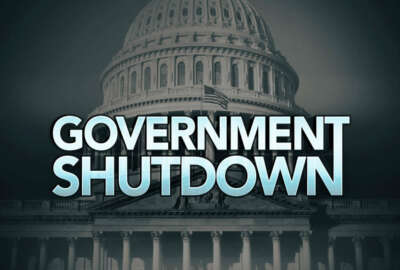

A majority of federal employees who took a Federal News Radio survey said the president's recent threats of a government shutdown had them feeling more concerned...
Though talk of a government shutdown has become customary for the month of September, recent comments from President Donald Trump over the 2018 budget has more federal employees feeling anxious about the upcoming end of the fiscal year.
About 57 percent of the 921 respondents who took an informal Federal News Radio survey said the president’s most recent comments have them feeling more concerned than usual. About 31 percent say they’re about as concerned as they’d usually be around this time of year, while nearly 10 percent said they’re less concerned than usual.
The president threatened the possibility of a government shutdown over funding for the construction of a wall along the southern border during a rally in Phoenix last week.
Those comments appeared to faze some federal employees, who used words like “destructive” and “reckless” when describing their reactions to the president’s comments.
“He is a businessman,” one respondent wrote of Trump. “Would he be closing his business? No, because that would affect his income. But he is sure willing to play with my income! He doesn’t care about the federal employees/middle class. We are not ‘thanked’ for our service like the military members working alongside us. You cannot even believe the hours that are spent preparing and implementing a government shutdown. This is usually accomplished by higher-grade level employees and is very costly because it prevents employees from doing the work they were hired to do.”

Yet others seemed unperturbed by the dialogue, describing it as “business as usual” for most agencies at the end of the summer.
“[It’s] normal posturing from a sitting president,” one respondent said. “It has happened in the past and will continue to happen. It’s Washington politics at its best (worst?). The 1995-1996 shutdown was a trip!”
“The uncertainty has become a way of life,” another said. “No one cares about government employees; we’re expendable.”
A majority of respondents — 59 percent — said they haven’t heard about their agency’s plans for the end of the fiscal year. About 21 percent said their agencies had not started to plan, while roughly 12 percent said they have heard about their agencies’ preparations.
If their agencies are starting to plan for a possible shutdown, many respondents described those activities as normal preparations for this time of year.
“My agency prepares every year, regardless of the rhetoric,” one person wrote.
Congress returns Sept. 5 from its August recess and has about 12 working days before the funding expires at the end of the fiscal year on Sept. 30.
That leaves lawmakers with little time to strike some sort of budget deal before Oct. 1. The House passed a minibus of spending bills at the end of July. The minibus sets appropriations for the departments of Defense, Energy, Interior, Veterans Affairs and other agencies, as well as the legislative branch. It also contains $1.6 billion for the construction of a wall along the southern border, but Senate Democrats have expressed their vehement opposition toward any bill that contains border funding.
Regardless of congressional disagreement over the border wall, multiple budget experts say the House minibus has little chance of Senate passage, as the appropriations bill sets topline figures above the spending caps put forth in the Budget Control Act of 2011.
Federal employees were relatively split in their predictions for the end of the fiscal year.
A majority, or 48 percent, said they believed Congress would pass some kind of short-term, continuing resolution by Sept. 30. Nearly 20 percent of respondents said they believed the government would shut down by the end of the fiscal year, and 18 percent predicted Congress would come to some sort of budget solution but the president wouldn’t sign the spending bill.
Federal employees’ reactions to the end of fiscal year antics ranged from anger and concern to apathy and disinterest.
“At this point, I couldn’t care less if we had a shutdown,” one respondent said. “With all the changes at work and [half] the time not knowing what’s next, it would be a welcome stress relief.”
“A shutdown would give hard working federal employees a much needed break, bring it on,” another respondent said. “It would be a disservice to the nation, however.”
For some, previous government shutdowns have altered their opinions of the president’s rhetoric.
“This is my fourth shutdown,” one respondent said. “I could use some more time off. Bring it!”
Others are concerned about the impact a shutdown might have on their pay and benefits. Some said they were worried what impact a government shutdown might have on their family’s finances.
“I am not concerned about shutting the government down, but I am concerned that this time we may not get paid retroactively,” another person said.
Federal employees received back pay after the 16-day government shutdown in October 2013. Several lawmakers have introduced legislation that would give federal employees back pay in the event the government closes. Those bills specifically applied to past shutdown threats earlier in April, but members of Congress have consistently introduced similar legislation during previous shutdown threats.
Other respondents said the shutdown talk influenced their retirement decisions.
“This constant budget inaction and CRs [have] me retiring at 62 instead of 68,” one person wrote.
Copyright © 2025 Federal News Network. All rights reserved. This website is not intended for users located within the European Economic Area.
Nicole Ogrysko is a reporter for Federal News Network focusing on the federal workforce and federal pay and benefits.
Follow @nogryskoWFED


